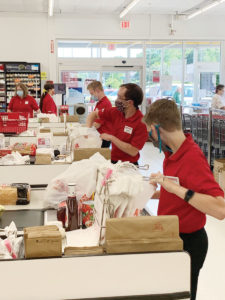The COVID-19 shopping pivot
11/4/2020The days of walking into a real estate open house unannounced or shaking hands with the salesperson from whom you purchase a car are seemingly gone.
From the moment COVID-19 first came onto the scene in March, business sectors have taken action to change their business, offer contact-less interaction and ensure the needs of customers are met in this new mask-wearing world.
Real estate companies change traditional open houses

Realtor Gina Swanson says her industry became even busier because people had time to be home and realized their space didn’t work for them.
There was a little element of panic in the real estate market when COVID-19 first came on the scene in March and people were told to distance themselves or stay away from others outside their immediate family.
“When you are listing a house, you are obviously exposing yourself and your home,” says Gina Swanson, a Realtor with Century 21 Signature Real Estate.
Swanson’s immediate response was to ensure she met the needs of her clients and made them feel safe. Agents shifted to virtual tours for many homes, not just higher-end houses, and asked prospective buyers to view the house that way before setting up an in-person tour.
Buyers were asked to wear masks, use hand sanitizer and minimize the items they touched in homes. All lights were left on and cabinet doors open for potential buyers. Clients who had health conditions waited a few months until COVID was better understood before listing their home.
Swanson replaced her coffee shop meetings with clients to a virtual Zoom meet, where she gets to know the client, explains the real estate process, and begins to understand the client’s needs. This has allowed her to meet clients’ needs faster because there’s less schedule coordination for a quick Zoom call versus an in-person meeting, which means she’s able to show homes faster.
Those Realtors who were willing to adapt to technology with meetings and virtual tours have done much better, according to Swanson, because people are still buying and selling houses.
“Many people, while at home, realized their homes weren’t working for them,” Swanson says. “Most of society is in and out, and when you take out the activities and work and social obligations, you are staying home and realizing ‘Does this space work for me?’ Our industry became even busier because people had time to be home and realize their space didn’t work, and they had nothing but time to look at other houses.”
Retailers move to curbside pickup, distance shoppers

Fareway employees are wearing masks as a result of new shopping
policies at the store.
Nationwide, retailers began offering curbside pickup and phone ordering for items big and small including clothing, shoes, electronics and more. Pickup stations were created outside stores, so employees could place items without coming into direct contact with customers. At other stores, customers stay in their vehicle while employees place items into their vehicle.
Customers at Homemakers furniture store can sit on and test furniture if they are comfortable doing so but are asked to wear a mask and remain socially distanced from others in the process.
“Because of the nature of fabric and leather, we are unable to deep clean the surface of each piece of furniture in our showroom at an increased frequency but are taking additional steps to make sure the area is clean, and the environment allows for safe shopping,” the company stated on its website.
This includes requiring employees to wear masks and having employees socially distance from customers; disinfecting all door handles, carts, escalator railings and customer service areas where transactions occur; placing hand sanitizer throughout the store; and installing Plexiglass shields at cash registers.
Homemakers also is offering contact-free shipping that places all furniture in factory packaging inside a customer’s garage, driveway or the first-floor entry of their house or apartment. Any customer who wants to pick up or return furniture can drive through and remain in their vehicle to make the process contact-free while Homemakers employees load and unload the furniture.
Auto dealerships provide more delivery, pick-up services
Stew Hansen says it follows all guidelines from the Centers for Disease Control and local health agencies. This includes requiring employees and customers to wear face masks or coverings when inside the dealership or vehicles, eliminating handshakes, adding touchless hand sanitizers throughout the store, and cleaning high-traffic areas more frequently.
The dealership also allows shoppers who do not want to visit in-person to utilize its website to browse inventory, set an appointment or chat with a customer service representative.
Stivers Ford Lincoln has a new “click-to-buy” sales program, where potential buyers can shop, trade in their vehicle and become pre-approved online. Shoppers also can have their purchase delivered to their home or office without having to come to the dealership.
This is a nationwide trend following consumer demand. In March, only 49 percent of dealerships in a DealerRater survey offered home delivery. That number rose to 66 percent in August.
It’s a service more customers want. DealerRater reports from an August 2020 survey that one in five recent car buyers took advantage of home delivery services. A group of separate buyers, who were surveyed in September, said three in five would use these services if they’re offered.
For those who want to trade in a vehicle, DealerRater’s August survey found that 51 percent, up from 33 percent in March, of dealerships offer online estimates for prospective trade-ins. Cars.com recommends anyone who wants to conduct an online trade-in confirm specifics of the trade-in appraisal. Some dealerships still require an on-site inspection, which can force in-person interactions.
More dealerships also are offering at-home test drives for vehicles and vehicle return policies for customers who are unhappy with their purchase. In some cases, a dealership will deliver the vehicle to a prospective buyer’s home for a set amount of time for the person to test drive the vehicle. This may require interaction with the delivery driver and contact with recently touched surfaces.
Even those dealerships that do not have a specific at-home test drive policy are often willing to accommodate requests on a case-by-case basis, according to Cars.com. Some may have virtual test drives online to get an idea of how things look behind the wheel through an all-virtual approach.
Grocery stores offer more contact-less options
From online shopping to self-checkout lanes, the grocery industry has responded to meet customer needs and wants.
Fareway first installed self-checkout lanes when the company opened its second Cedar Falls store in January 2019, company spokeswoman Emily Toribio says. The company has continued to add more in new store locations and to renovate existing stores, so that more than 30 stores now have self-checkout lanes. Each typically has four units.
“We will continue with this project until most stores have the option available,” Toribio says.
The self-checkout lanes started pre-COVID to evolve and provide the best service for all shoppers. Doing this allows store employees to concentrate on stocking the shelfs with fresh product and assisting customers throughout the store, she says.
As a result of COVID, Fareway activated several internal protocols to increase sanitation measures of high-touch surfaces and overall store-cleaning frequency, along with the availability of hand sanitizer and wipes.
Several grocery chains, Fareway included, initially adjusted their grocery hours to allow for more time to clean and also reserved the first hour of business for customers age 65 and older, pregnant women and those with serious, chronic or an underlying medical condition.
Fareway returned to its normal business hours but asks customers and employees to continue to social distance. It also placed distance markers in strategic locations throughout the store, installed plexiglass shields at checkout areas, required employees and store vendors to wear masks, and encouraged customers to wear a mask. The store has limited returns and is not accepting cans and bottles for redemption in stores, Toribio says.
In some areas, community partners work with Fareway to obtain orders on behalf of certain individuals and to provide delivery and pick-up service. FarewayMeatMarket.com will direct ship meat and complimentary side dishes to customers’ homes, Toribio says.
She also says that the company is working toward the capacity for online ordering from local stores and hopes to have more details available in the near future.
Curbside pickup and delivery for groceries has become the new norm for many consumers amid COVID.
Retailer Walmart and grocery chain HyVee already offer online ordering and pick-up or delivery service. In mid-October, Amazon launched free grocery pickup with one-hour arrival windows for orders of $35 or more from Whole Foods Markets for Amazon Prime members. It’s available from all Whole Foods stores in the United States.
What’s next for all categories of business is uncertain, but changing to meet the needs of customers is certainly nothing new and is now even more important for all companies, large and small. ♦





















